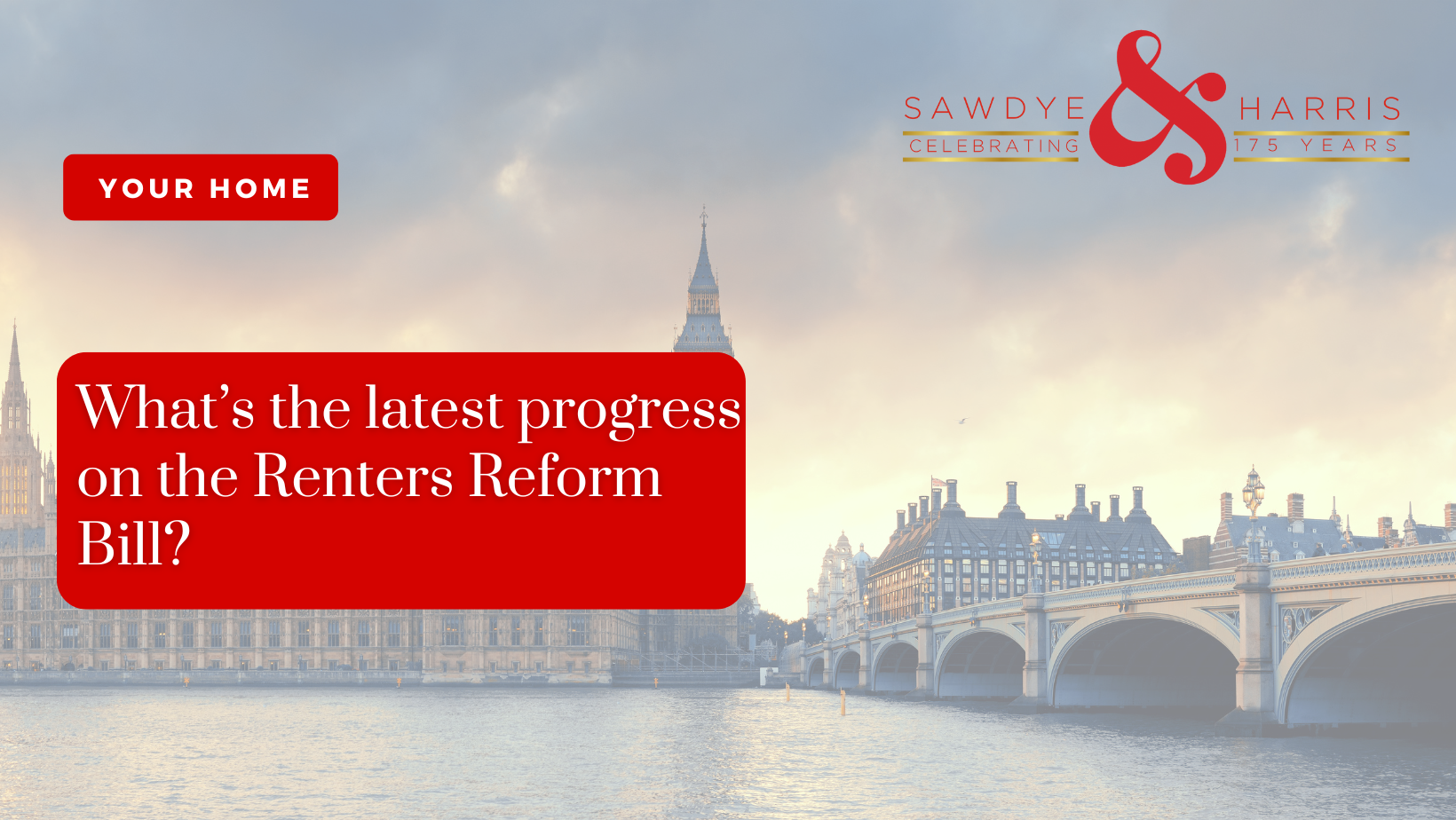What’s the latest progress on the Renters Reform Bill?
The Renters Reform Bill finally resumed its journey through Parliament with the Second Reading of the Bill on 23 October, which passed without a vote due to cross-party support. The latest news is that the Bill will progress to the Committe Stage through the House of Commons, which will start following the King’s Speech on 7 November.
The cross-party Levelling Up, Housing and Communities Select Committee originally published its report, Reforming the Private Rented Sector, on 9 February 2023. The Government finally issued its overdue formal response on Friday 20 October, at the eleventh hour before the Second Reading debate of the Bill in the House of Commons on the following Monday, 23 October. Just in time before Parliament was prorogued on 26 October.
The Government response was released six months after the publication of the Select Committee report, instead of the usual two. Michael Gove apologised for the delay in the Second Reading debate. There are signs that the publication of the response was rushed as there are duplicate paragraphs on page 10 and some typos.
As well as announcing two key changes to the Renters Reform Bill, the response shed further light on Government plans for other matters in the Renters Reform Bill, together with additional matters that affect the PRS, but aren’t in the Bill.
Two changes to Renters Reform Bill announced in Government response
After waiting six months to publish its response to the Levelling Up Select Committee’s recommendations, the Government only agreed to one small modification to the Renters Reform Bill, and a delay to the implementation of one key aspect.
Here are the two principal concessions to the recommendations of the Select Committee:
1. Linking of abolition of Section 21 to court reform
Implementation of the new system will not take place until we judge sufficient progress has been made to improve the courts. This means we will not proceed with the abolition of section 21, until reforms to the justice system are in place.
The abolition of Section 21 was in the Conservative Party election manifesto in 2019. According to the White Paper, A Fairer Private Rented Sector, Section 21 was always due to be implemented on the second implementation date, at least 18 months after Royal Assent (say the end of 2025 or the spring of 2026). Yet despite this delay in implementation that was built into the transition arranges, the court system will apparently not be ready in time for what would have been the likely implementation date at least two years from now.
The Government response gives no information as to exactly how “sufficient progress” will be assessed. Instead, the section on court reform refers vaguely to “digitising more of the court process”, “exploring the prioritisation of certain cases, including antisocial behaviour”, improving the bailiff system and providing “early legal advice and better signposting for tenants.” Certainly no SMART objectvies here!
There is no detail what “digitising” means (other than it will apparently be “end to end”), or how the prioritisation of cases will work. It also doesn’t explain how the new grounds of possession will be made “faster and easier to prove”.
2. New Ground for Possession for student tenancies
We recognise that the student market is cyclical and that landlords must be able to guarantee possession each year for a new set otf tenants, and we will introduce a new ground for possession to facilitate this.
The Government did not accept the Select Committee’s recommendation that fixed-term tenancies be retained for the entire student market (not just purpose built student accommodation). DLUHC justified this by saying that “retaining fixed terms would unfairly lock students into contracts, meaning they could not leave if a property is poor quality or their circumstances should change”.
Instead, DLUHC proposes introducing a “ground for possession that will facilitate the yearly cycle of short-term student tenancies”. The response does not clarify whether this would be a mandatory or discretionary ground, or how much notice the landlord will need to give the tenant. Under the new Section 8, notice ranges from two weeks to two months, apart from the new Ground 7A (severe antisocial behaviour) and Ground 14 (antisocial behaviour), which will both be immediate.
Whilst this is a welcome step, failing to allow fixed term periods for student tenancies will leave many student landlords with voids from after the exam period in May until the start of the new academic year at the end of September. In order to receive the same annual income, student landlords will probably cost in the longer void periods by increasing the monthly rent. Let’s hope that this issue is revisited in the Committee Stage.
What’s new in the Government response to Levelling Up Select Committee?
1. Government plans to improve court possession process
The Government did not accept the Select Committee’s recommendation to introduce a specialist housing court, but “recognises the importance of making sure that the process is as smooth and efficient as possible”.
We are working closely with the Ministry of Justice and HM Courts and Tribunal Service to drive forward improvements to the court possession process so that users have a modern, digital service that will align with the reforms to tenancy law.
No timings for the improvements were given in the response. However, given that the abolition of Section 21 wasn’t due to come into effect for some time in any event (late 2025 / early 2026, depending on Royal Assent), reading between the lines, we must be looking at perhaps even 2027 or 2028 before the court reforms will be complete. If the opinion polls are to believed, it is highly conceivable that this will be under a new Government.
2. Antisocial Behaviour Grounds for Possession
The response contains two identical paragraphs on page 10 (suggesting rushed proof-reading) that they would “expand the principles that judges must take account of when deciding if an eviction is reasonable”. They give the examples of giving “more weight to the impact on victims and whether the tenant has failed to engage with other interventions to manage their behaviour”.
DLUHC rejected the Select Committee’s recommendation to make Ground 14 (non-criminal antisocial behaviour) mandatory as this would require a list of specific behaviours in legislation. They did not, for instance, propose widening Ground 7A to include more examples of antisocial behaviour, and leave the less severe cases to the discretion of the judge.
3. More detail on what to take into account with pet requests
DLUHC rejected the Select Committee’s proposal to drop the new implied right to request to keep a pet. Instead, the response gives examples of the factors which they anticipated landlords would take into account when making their decision.
The examples were the size of the pet and property, whether the property or common parts are shared with other tenants (this is likely to mean HMOs or flats), allergies or phobias and, “if relevant, access to outdoor space”. A landlord “could likely refuse” if the animal was too big for a small property or if another tenant in a shared house had an allergy or phobia. In other words, no blanket ban for HMOs.
4. Update on the Privately Rented Property Portal
It is clear that the design of the Property Portal is far from complete. Even the compliance information that landlords will need to upload is not confirmed. For instance, compliance information “could” include gas and electrical safety certificates. The Government is “considering” that landlords self-certify compliance with the Decent Homes Standard (which has still not been published).
They “expect” the penalty system to be “tiered”, with different penalties for different offences. They are also “considering” data collection options “that will minimise the burden on private landlords”, by using “existing datasets where possible”. Presumably this means EPCs.
5. Government will review selective licensing once Property Portal is “fully operational”
There is no commitment to abolish selective licensing; only that they will “review” it, once the portal is “fully operational”.
Next step for the Renters Reform Bill: The Committee Stage
The next stage for the Bill is the Committee Stage, when the Bill will be scrutinised line by line. Given that Parliament has now been prorogued until after the King’s Speech on 7 November, the Committee Stage will start in the second or third week of November.
Stages still to come
The Report Stage and Third Reading will follow the Committee Stage, after which the process begin again in the House of Lords.
As a carry over motion was passed, the Bill will automatically carry over to the next Session of Parliament, which starts on 7 November.
Sources: Propertymark and Suzanne Smith - The Independent Landlord





